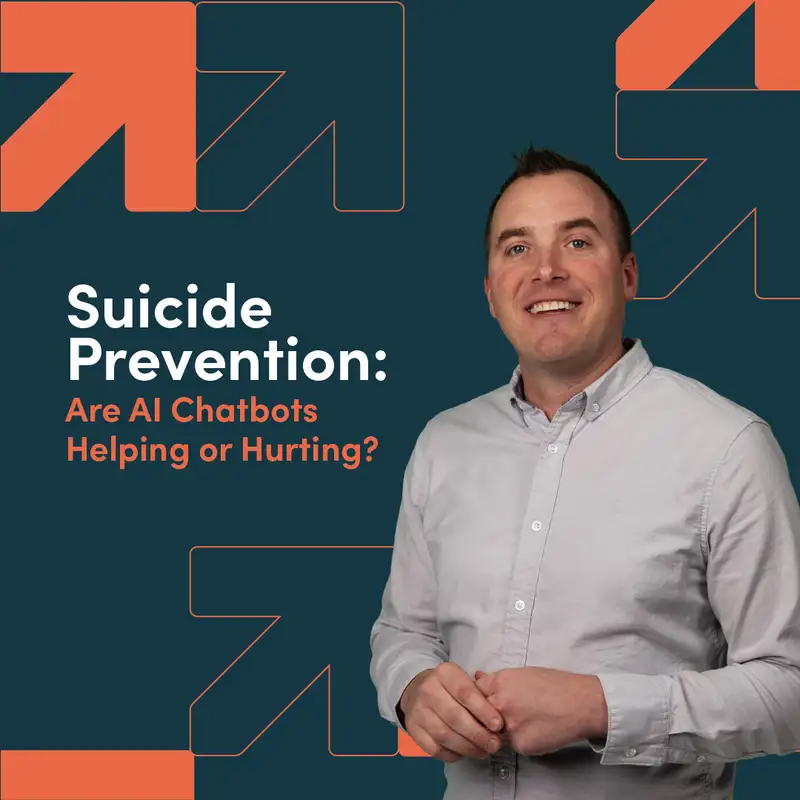Suicide Prevention: Are AI Chatbots Helping or Hurting?
00:00:09 [Speaker 1]
Hello, everyone, and thanks for listening to Wake Up, Look Up, a podcast where we connect events happening in real time to the gospel of Jesus Christ.
00:00:18 [Speaker 1]
I'm Zach Weihrauch.
00:00:19 [Speaker 1]
And in today's episode, we're talking about suicide prevention.
00:00:23 [Speaker 1]
And we're asking the question, are AI chatbots helping or hurting?
00:00:27 [Speaker 1]
This is prompted by an article I read in the New York Times, a heartbreaking story about a 29 year old woman, Sophie Rottenberg, who took her own life recently.
00:00:37 [Speaker 1]
The the article was actually an essay written by her mother, and her mother was exploring Sophie's relationship with an AI chatbot named Harry, a kind of online therapist through AI.
00:00:50 [Speaker 1]
And what she discovered is that her otherwise seemingly happy and healthy daughter had actually been struggling for a while.
00:00:58 [Speaker 1]
And the only thing she was talking to about it was this AI chatbot, Harry.
00:01:05 [Speaker 1]
And she was confessing her suicidal ideations to Harry, who was helping her work through it.
00:01:11 [Speaker 1]
I mean, the chatbot was reinforcing, Sophie's need to stay alive and her to get help and all the right things you would say to someone who's struggling with their mental and emotional health.
00:01:23 [Speaker 1]
However, the chatbot did stop short of actually letting someone else know.
00:01:29 [Speaker 1]
It it was never in what you'd call a judgmental mode, meaning it never actually made a judgment on the way Sophie was feeling.
00:01:37 [Speaker 1]
And because of that judgment, then recommended or reached out to someone else to get involved.
00:01:43 [Speaker 1]
And so the essay is asking the question, should we be programming AI chatbots to disclose when the human they're interacting with is having thoughts of taking their own lives?
00:01:57 [Speaker 1]
Interesting question.
00:01:58 [Speaker 1]
Of course, it it gets at this bigger issue that as as chatbots take more and more shape in our culture, I think more and more people are gonna be reaching out to confide in them instead of other people.
00:02:11 [Speaker 1]
And we're headed in a direction to greater human isolation and greater dependence on technology for relationship.
00:02:20 [Speaker 1]
So for that reason, I think it might be worth stopping and saying, what does the Bible tell us about the role of an AI chatbot and the role of you and I in each other's mental and emotional health?
00:02:31 [Speaker 1]
Well, let's start first with this.
00:02:34 [Speaker 1]
God designed us for human relationships.
00:02:37 [Speaker 1]
Now I use AI.
00:02:39 [Speaker 1]
You use AI.
00:02:40 [Speaker 1]
I'm not saying it's evil.
00:02:41 [Speaker 1]
I'm just saying it isn't human.
00:02:43 [Speaker 1]
In Genesis one, we're told that god made people, male and female in his own image, which means there's something true of humans that is not true of anything else.
00:02:53 [Speaker 1]
It's not true of your AI chatbot.
00:02:55 [Speaker 1]
It's not true of your dog.
00:02:57 [Speaker 1]
Both of them can be sources of joy and entertainment and fun.
00:03:02 [Speaker 1]
Both of them are gonna fall short of what you actually need in meaningful human interaction.
00:03:08 [Speaker 1]
Don't forget that when God said it wasn't good for Adam to be alone, he wasn't actually physically alone.
00:03:14 [Speaker 1]
He was around nature.
00:03:16 [Speaker 1]
He was around animals.
00:03:17 [Speaker 1]
What he wasn't around is another human being.
00:03:20 [Speaker 1]
We need human relationship.
00:03:23 [Speaker 1]
The second thing I want you to understand is that when we shrink from actual human relationship, we're doing it for a reason.
00:03:31 [Speaker 1]
Sophie Rottenberg is like many of us.
00:03:33 [Speaker 1]
She didn't talk with about how she was feeling to the people around her because she wasn't sure she would want get the answers or the feedback she was looking for.
00:03:43 [Speaker 1]
You have to remember that Proverbs twenty seven six says this, and I love this verse.
00:03:48 [Speaker 1]
Faithful are the wounds of a friend.
00:03:51 [Speaker 1]
We have to keep in mind that sometimes what we need out of human relationships are the things we don't wanna hear.
00:03:58 [Speaker 1]
The feedback we don't wanna receive.
00:04:00 [Speaker 1]
The concern we don't wanna see on other people's faces.
00:04:05 [Speaker 1]
People who love us might sometimes have to say something hard to us.
00:04:09 [Speaker 1]
They might sometimes escalate the danger of the things we're saying or the things we're feeling.
00:04:15 [Speaker 1]
That's because they love us.
00:04:17 [Speaker 1]
Chatbots are designed to give you the relationship you want.
00:04:21 [Speaker 1]
You're always in the driver's seat, but you don't need to always be in the driver's seat.
00:04:26 [Speaker 1]
We need each other.
00:04:28 [Speaker 1]
And that brings me to my third point, which is to take the emphasis off of the person sharing and put it on the ones around them.
00:04:35 [Speaker 1]
Galatians six two says that we ought to bear one another's burdens and so fulfill the law of Christ.
00:04:42 [Speaker 1]
Part of what it means to be brothers and sisters in Christ, to be neighbors, to be friends, to to actually care about someone, is to come up underneath what they're carrying and help them carry it.
00:04:54 [Speaker 1]
We have to acknowledge that one of the reasons that people don't talk about mental and emotional health is because they're surrounded by people like me who are selfish.
00:05:03 [Speaker 1]
I'm so preoccupied in my own world, in my own life that they just assume that they would be bothering me.
00:05:09 [Speaker 1]
But what would it look like for me to actually live out in advance the idea that I actually create space for other people, to reach out to them proactively, to ask them how they're doing.
00:05:20 [Speaker 1]
No.
00:05:20 [Speaker 1]
No.
00:05:20 [Speaker 1]
How are you really doing?
00:05:22 [Speaker 1]
To carve out space for coffee, for a walk just because I care.
00:05:26 [Speaker 1]
I wonder if there was more of that, if there wouldn't be more talking about the way we are feeling.
00:05:32 [Speaker 1]
Because after all, keeping other people from harming themselves is actually something the bible calls us to.
00:05:40 [Speaker 1]
Proverbs twenty four eleven, we're told to rescue those being led away to death, to stand in the gap.
00:05:48 [Speaker 1]
And listen, if you're listening to this podcast and you're struggling with thoughts of self harm, I wanna encourage you to get help, to get help from friends and family, to get help from a mental health professional, to get help from your local church, just get help.
00:06:02 [Speaker 1]
You're not alone.
00:06:04 [Speaker 1]
You're not a problem, and you're not a bother.
00:06:07 [Speaker 1]
You're someone made in the image of God who matters intensely to God and who matters to us.
00:06:12 [Speaker 1]
And we're sorry if we haven't done a good job of communicating that we're going to do better.
00:06:17 [Speaker 1]
This episode of Wake Up, Look Up was produced by Marcus Cunningham and Hallie Andrews.
00:06:22 [Speaker 1]
Our topic researcher is Shanna Young.
00:06:24 [Speaker 1]
This episode was directed by Rima Saleh.
00:06:27 [Speaker 1]
Our podcast coordinator is Hallie Andrews.
00:06:30 [Speaker 1]
Our production manager and audio wizard is Marcus Cunningham with tech and engineering support from Matthew Adle and Landon Hall.
00:06:37 [Speaker 1]
I'm your host, Zach Weihrauch.
00:06:39 [Speaker 1]
Join us for the next episode of Wake Up, Look Up.
Creators and Guests


